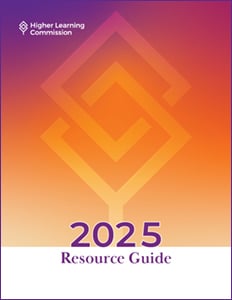Publications
White Papers
Guidelines on HLC Requirements
The following guidelines have been developed to assist institutions and peer reviewers in determining whether an institution is meeting the Criteria for Accreditation or other HLC requirements:
Determining Faculty Qualifications
HLC’s Determining Faculty Qualifications (November 2023) provides guidance to institutions and peer reviewers in evaluating institutional policies and procedures for determining faculty qualifications. The guidelines highlight the Criteria for Accreditation and Assumed Practices that speak to the importance of institutions accredited by HLC employing qualified faculty for the varied and essential roles faculty members perform.
Dual Credit Faculty Qualification Requirements: During 2016 and 2017, approximately 150 HLC member institutions applied for and received extensions related to their compliance with HLC’s Assumed Practice B.2.a as that requirement applies to dual credit faculty. In June 2022, the HLC’s Board of Trustees extended the deadline for enforcement of faculty qualifications requirements in the context of dual credit education from September 1, 2023, to September 1, 2025. All institutions with dual credit enrollment programs that have previously applied for and received an extension are automatically granted this extension. There is no need to re-apply.
Personally Identifiable Information
HLC has provided guidelines on personally identifiable information (PII), which is defined as any information about an individual that allows the individual to be specifically identified. This includes, but is not limited to: name, address, telephone number, birthday, email, social security number, bank information, etc. A document does not include PII if personal information is de-identified or is provided in the aggregate.
When submitting information and documents to HLC, institutions are asked to carefully consider whether information or documents containing PII must be included. If the information or documents must be included for evaluative purposes, institutions should redact the PII where possible. If redaction of the PII will interfere with the evaluative value of thedocument, institutions should clearly identify the document as containing PII (for example, through a cover page or prominent notation on the document). Institutions are not expected to redact or identify information or documents where the only PII included is employee or Board member names and work contact information.
Dual Credit
These guidelines offer institutions and peer reviewers formal guidance on the evaluation of dual credit activity at member institutions. HLC defines dual credit courses as “courses taught to high school students for which the students receive both high school credit and college credit.” Dual credit programs are reviewed during an institution’s comprehensive evaluation, but also may be reviewed at other times if concerns about the programs arise.
Maintaining Institutional Autonomy
These guidelines are intended to provide member institutions that are not separately incorporated from a parent organization with a framework for how they can satisfy HLC’s expectation that the institution’s governing board is able to demonstrate sufficient autonomy.
School of Record
Institutions acting as a School of Record must be able to ensure academic integrity and transparency in the transcription of coursework taken abroad by students. They also must ensure appropriately trained personnel are evaluating such courses or programs and that the institution has established processes for evaluation that are applied in a consistent fashion. These guidelines highlight the Criteria and Assumed Practices relevant for these institutions.
Evaluating Reduced-Credit Bachelor’s Degree Programs
These guidelines assist institutions and peer reviewers in evaluating reduced-credit bachelor’s degree programs in the context of HLC’s Criteria for Accreditation. The guidelines apply to institutions initially seeking to offer, and then subsequently offering, a reduced-credit bachelor’s degree program. Likewise, the guidance will inform peer reviewers evaluating an application from an institution that is seeking to offer a reduced-credit bachelor’s degree program, or evaluating an institution that is offering such programs.
Position Statements
HLC is an active member of the higher ed community. We work regularly with other higher ed organizations, including the Council for Regional Accreditation Commissions, to communicate with other members of the Triad on issues that matter to you. Check out the Advocacy Agenda to see position statements made by HLC.
Sign Up for More
Subscribe to Leaflet to stay informed about our new publications. Reach out to [email protected] with any questions.

